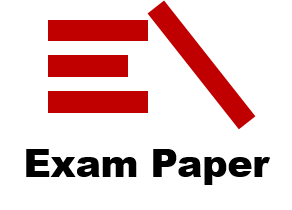
TOEFL High Score Guide: Effective Preparation Tips and the Golden Value of Past Papers
Share
Master the core techniques of the TOEFL exam and fully leverage the power of past papers to ensure language proficiency is no longer a barrier on your study abroad journey
The TOEFL exam, as a globally recognized English proficiency test, is an important threshold that many international students must cross. As competition for studying abroad intensifies, the importance of TOEFL scores has become increasingly prominent. This article systematically breaks down effective TOEFL preparation techniques and explores the golden value of past papers in the preparation process, helping test-takers avoid common pitfalls and maximize their study efficiency.
Understanding the TOEFL Exam: A Comprehensive Look at Your Challenge
The TOEFL iBT (Internet-Based Test) comprehensively evaluates test-takers' academic English abilities across four sections:
Reading (54-72 minutes, 30-40 questions): Assesses comprehension and analysis of academic passages
Listening(41-57 minutes, 28-39 questions): Tests understanding of lectures and conversations
Speaking (17 minutes, 4 tasks): Evaluates oral expression skills in academic settings
Writing (50 minutes, 2 tasks): Measures academic writing capability
Effective TOEFL Preparation Strategies
1. Section-Specific Breakthroughs and Targeted Strengthening
Reading Section:
- Develop skills for quick skimming and locating key information
- Learn to identify passage structure and logical relationships
- Build academic vocabulary, particularly paraphrasing expressions
Listening Section:
- Practice note-taking techniques to capture main ideas and supporting details
- Familiarize yourself with various academic scenarios and common patterns in campus conversations
- Train to recognize speakers' attitudes and purposes
Speaking Section:
- Use templates flexibly rather than memorizing rigidly
- Improve speed of organizing thoughts within the 15-second preparation time
- Record yourself to analyze fluency, pronunciation, and grammar issues
Writing Section:
- Integrated Writing: Accurately summarize relationships between listening and reading materials
- Independent Writing: Build your own repository of viewpoints and examples
- Master basic conventions of academic writing and common expressions
2. Time Management Strategies
- Reading: Approximately 18 minutes per passage, skim questions first before reading strategically
- Listening: Use answer gaps to preview options for next questions
- Speaking: Strictly adhere to preparation and response times during practice
- Writing: 20 minutes for Integrated, 30 minutes for Independent, reserving time for review
3. Simulate Real Testing Conditions
- Practice listening with headphones to adapt to test equipment
- Practice in environments with some background noise to simulate test conditions
- Complete full 4-hour mock tests to build exam endurance
The Golden Value of Past Papers: Why They're Indispensable
1. Understand ETS's Question Design Thinking and Preferences
Official past papers best reflect exam question patterns:
- Familiarize with common topics and question types
- Understand characteristics of correct answers and traps in wrong options
- Grasp difficulty trends and scoring criteria
2. Experience Real Exam Rhythm and Pressure
Through past paper practice, you can:
- Adapt to time allocation across the 4-hour exam
- Develop ability to quickly switch between different question types
- Establish time awareness and reduce anxiety during the actual test
3. Precisely Identify Weak Areas
Past papers provide the most accurate self-assessment:
- Identify strengths and weaknesses across sections (e.g., detail questions vs. inference questions)
- Discover frequently made error types and knowledge gaps
- Evaluate gap between current level and target score
4. Optimize Test-Taking Strategies
By analyzing past paper performance, you can:
- Adjust time allocation strategies to avoid over-spending on certain sections
- Improve note-taking methods to enhance information capture efficiency
- Develop shortcuts for different question types
5. Predict Exam Trends
Recent past papers are particularly valuable:
- Understand latest question type changes and topic tendencies
- Master recent adjustments in scoring criteria
- Grasp patterns in exam difficulty fluctuations
## How to Maximize the Use of Past Papers?
1. **Use in Phases**: Familiarize with question types initially, intensify training mid-phase, conduct full mock tests later
2. **Detailed Analysis**: Focus not just on right/wrong answers but understand the testing intention behind each question
3. **Repeat Practice**: Important papers can be practiced multiple times until concepts are fully mastered
4. **Simulate Test Conditions**: Complete under strict timing and create realistic testing environments
Avoid Common Preparation Pitfalls
- ❌ Only doing questions without analysis: Blind practice has limited effect
- ❌ Ignoring weak areas: Only practicing strengths prevents comprehensive improvement
- ❌ Memorizing templates rigidly: Mechanical application leads to low scores
- ❌ Neglecting certain sections: All four sections are important without obvious weaknesses
**TOEFL preparation is a marathon, not a sprint**. Through scientific methods, consistent practice, and full utilization of past papers, you can steadily improve and ultimately achieve your desired score. Remember, each past paper is your most valuable preparation resource—using them well is a crucial step toward high scores.
Wishing every test-taker outstanding performance in the TOEFL exam and the realization of their study abroad dreams!
